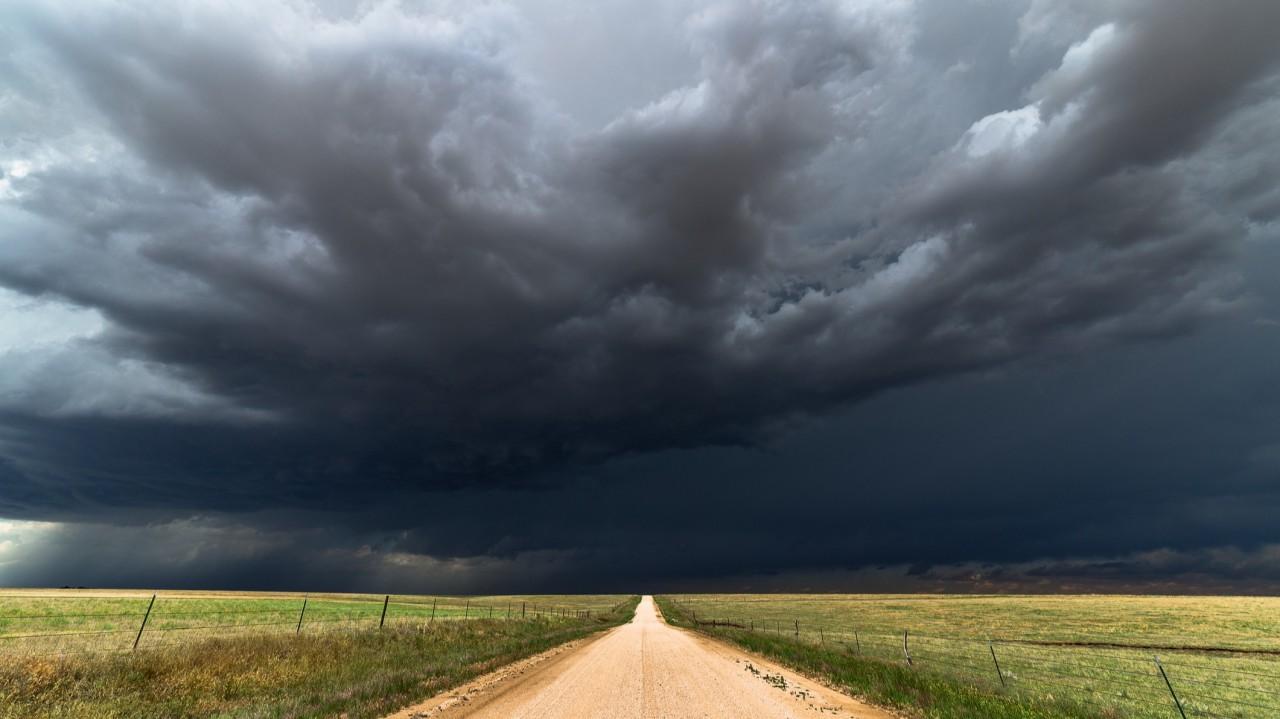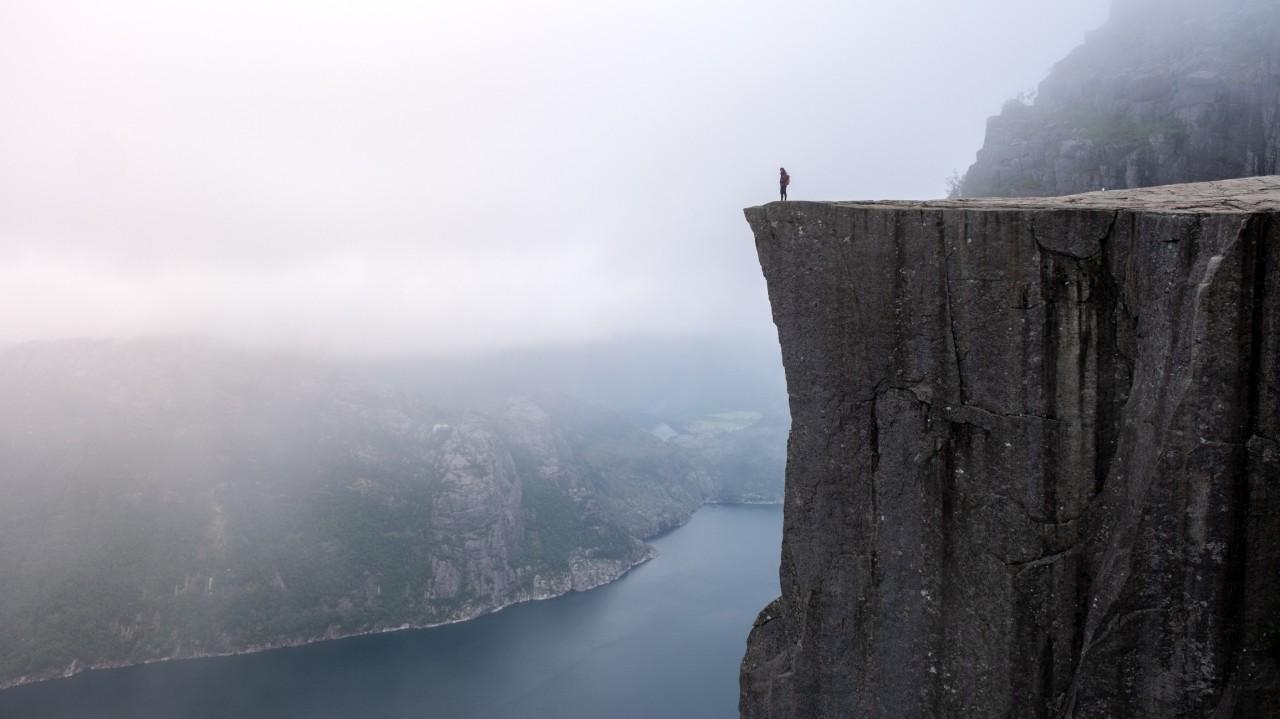“I’d go to California or a really wealthy European city with a high degree of scientific knowledge,” said the CIO. We were discussing shifting global orders, opportunities, and I asked where he’d move to if he were 25 again. “California first, to learn something, and then Europe to build, where it’s a bit easier and you may have a lot more support looking out over 5yrs.” He grew up in the US, lived all over the world, chasing opportunities, and left Asia after China retook Hong Kong. “Why isn’t there more tech innovation here in Switzerland other than inside the very large firms? It makes little sense. And perhaps that starts to change.”
Overall: “No one could have thought that the world’s biggest democracy, whose economic model relies so heavily on science, on innovation and on its ability to have disseminated this innovation more widely than its European peers, would make such a mistake. But here we are,” said Macron, playing to an audience of Europe’s insular elite, his country sliding further right. “Without free scientific inquiry, we lose pillars of our societies which are the very heart of western liberal democracies, first and foremost of which is our relationship with the truth,” added Macron, sensing a once in a generation opportunity to reverse the inexorable trend toward US exceptionalism. Naturally, the Europeans will squander this moment. They always do. But that doesn’t mean their markets won’t offer bursts of outperformance - smash-and-grab trades, hit-and-runs. Each opportunity looks different, and this one is ironic. You see, European leaders are cynical elitists, and their gripe with Americans is that we’re unsophisticated idealists. So, the basis of this countertrend trading opportunity is that an unsophisticated America is now unleashing its inner cynic, as Europe attempts to explore it inner American. Anyhow, European Commission President Ursula von der Leyen proposed a 500mm euro package to be spent in 2025-27 “to make Europe a magnet for researchers” and to support those who choose to relocate to the continent. She had the class to not mention Trump or the Americans by name but said, “Open and free science is Europe’s calling card. We must do everything we can to uphold it, now more than ever before.” And the idealists still left amongst us envision a day when this moment passes, with America successfully addressing the gross inequality that had been ignored by our elite and led us here. While the cynics within us envision a future when Europe’s discontented rightward-shuffling masses topple an elite which continues to dismiss their growing grievances.
Week-in-Review: Mon: EU to propose banning Russian gas imports by end of 2027. Trump says fall in oil prices to pressure Russia to end its war in Ukraine. Israeli security cabinet approves plans to escalate its offensive in Gaza. OpenAI walks back for-profit plan. Taiwan dollar jumps 6.5% in two days over trade deal fears, up nearly 10% since beginning of April. Warren Buffett to step down from Berkshire Hathaway. US ISM Serv PMI 51.6 (50.2e), Turkey CPI 37.86% (38.00%e), S&P -0.6%. Tue: India launches military strikes in Pakistan. German parliament backs conservative leader Merz as chancellor after two failed attempts. Trump meets with Canadian PM Carney, both parties open to renegotiating the USMCA trade agreement. US and Iran plan to hold a fourth round of nuclear talks in Oman. US says Houthis agreed to halt attacks on regional shipping in the Red Sea. UK and India announce trade deal after three years of negotiations. Eurozone PMI serv 50.1 (49.7e) / comp 50.4 (50.1e), UK PMI serv 49.0 (48.9e) / comp 48.5 (48.2e), US Trade balance -$140.5b (-137.2b e), S&P -0.8%. Wed: Fed holds rates at 4.25-4.5%, warning of risks to inflation and unemployment. Xi and Putin embark on four-day summit in Moscow. Denmark summons US ambassador over Greenland espionage report. France and Germany to set up joint security council. Pakistan reports 31 dead, 57 injured from Indian air strikes and vows to retaliate. India's defense minister denies air strikes caused any civilian casualties. Trump says no potential for pulling back tariffs on China. China cuts key interest rate to 1.4%. Eurozone Ret sales 1.5% (1.6%e), S&P +0.4%. Thur: US and UK seal first deal of Trump’s trade war. China says Vice-Premier He Lifeng to lead trade talks with US. BoE cuts rates by 25bps to 4.25% in a very divided vote. Trump offers to mediate India-Pakistan conflict. EU countries push to delay retaliation against Trump to avoid Nato clash. Toyota warns profits set to fall 21% due to US tariffs. US Jobless claims 228k (230k e) / Cont claims 1879k (1895k e), Mexico CPI 3.93% (3.90%e), S&P +0.6%. Fri: Pakistan launches military retaliation against India. Trump signals openness to cutting China tariffs ahead of Geneva talks, proposes to raise income taxes on Americans earning more than $2.5m. ECB’s Schnabel says higher prices from tariffs could limit rate cuts. BoE governor Bailey says UK-US trade deals still leave Britain facing high tariffs. Ukraine accuses Hungary of espionage and plots for incursion. China CPI -0.1% as exp, Brazil CPI 5.53% (5.52%e), Canada Unemp rate 6.9% (6.8%e), S&P -0.1%. Sat: India and Pakistan announce US brokered ceasefire. China and US kick off high-stakes trade talks in Geneva. Iran’s FM visits Saudi Arabia, Qatar before nuclear talks with US in Oman on Sunday. Sun: Happy Mother’s Day to all you Mothers out there! Trump claims major progress in China trade negotiations.
Manufacturing PMI (high-to-low): India 58.2 (previous month 58.1), Sweden 54.2 (prev mth 53.8), Greece 53.2 (prev 55), China 50.4/51.2, Brazil 50.3/51.8, Hungary 50.2/51.4, Poland 50.2/50.7, South Africa 50/48.3, Singapore 49.6/50.6, Italy 49.3/46.6, Russia 49.3/48.2, Netherlands 49.2/49.6, Czech Republic 48.9/48.3, US 48.7/49, France 48.7/48.5, Japan 48.7/48.4, Germany 48.4/48.3, Hong Kong 48.3/48.3, Spain 48.1/49.5, Taiwan 47.8/49.8, South Korea 47.5/49.1, Turkey 47.3/47.3, Indonesia 46.7/52.4, Austria 46.6/46.9, Norway 46.12/50.08, Switzerland 45.8/48.9, Vietnam 45.6/50.5, UK 45.4/44.9, Canada 45.3/46.3, Mexico 44.8/46.5. Services PMI: India 58.7/58.5, Spain 53.4/54.7, Italy 52.9/52, Ireland 52.8/55.3, Japan 52.4/50, Australia 51/51.6, US 50.8/54.4, China 50.7/51.9, Russia 50.1/50.1, UK 49/52.5, Germany 49/50.9, Brazil 48.9/52.5, Sweden 48.4/49.3, France 47.3/47.9.
Weekly Close: S&P 500 -0.5% and VIX -0.78 at +21.90. Nikkei +1.8%, Shanghai +1.9%, Euro Stoxx +0.3%, Bovespa +1.0%, MSCI World -0.3%, MSCI Emerging +0.5%, Bitcoin +6.0%, and Ethereum +35.0%. USD rose +1.0% vs India, +0.9% vs Canada, +0.6% vs Sweden, +0.5% vs Turkey, +0.5% vs Indonesia, +0.4% vs Euro, +0.3% vs Australia, and +0.3% vs Yen. USD fell -1.2% vs Chile, -1.1% vs South Africa, -0.7% vs Mexico, -0.5% vs China, -0.4% vs Russia, -0.3% vs Sterling, and -0.1% vs Brazil. Gold +3.1%, Silver +2.0%, Oil +4.7%, Copper -0.4%, Iron Ore -0.5%, Corn -4.1%. 10yr Breakevens (EU -1bps at 1.78%, US +4bps at 2.31%, JP +11bps at 1.58%, and UK -7bps at 3.14%). 2yr Notes +7bps at 3.89% and 10yr Notes +7bps at 4.38%.
2025 Year-to-Date Equity Index Returns: Poland +42% priced in US dollars (+29.7% priced in zloty), Czech Republic +33.2% priced in dollars (+21.9% in koruna), Hungary +30.8% in dollars (+18.6% in forint), Chile +30% (+22.7%), Greece +29.6% (+19.1%), Germany +27.9% (+18%), Austria +27.5% (+17.7%), Spain +27.2% (+16.9%), Italy +24.7% (+15.2%), Brazil +24.2% (+13.5%), Colombia +24.2% (+19.3%), Mexico +22.2% (+14.2%), Ireland +21.4% (+11.5%), Euro Stoxx 50 +18% (+8.5%), Norway +17.6% (+6.9%), Portugal +16.9% (+7.4%), Venezuela +16.8% (+99%), Finland +16.5% (+7.5%), South Africa +15.9% (+11.9%), France +14.1% (+4.9%), HK +13.8% (+14%), Switzerland +13.4% (+4.2%), Korea +13.2% (+7.4%), Netherlands +12.1% (+3.1%), Israel +12% (+10%), Sweden +12% (-1.4%), Belgium +11.6% (+2.6%), UK +11.3% (+4.7%), Singapore +7.8% (+2.3%), Canada +5.9% (+2.5%), Australia +4.6% (+0.9%), Philippines +3.4% (-1.1%), UAE +2.2% (+2.2%), Japan +1.7% (-6%), New Zealand +1.6% (-3.9%), India +1.6% (+1.5%), China +0.6% (-0.3%), MSCI World +0.1% in dollars, Taiwan -1.5% (-9.2%), Vietnam -1.8% (+0%), Malaysia -2% (-5.8%), S&P 500 -3.8%, Indonesia -5.4% (-3.5%), Saudi Arabia -5.4% (-5.6%), NASDAQ -7.2%, Russell -9.3%, Thailand -10.2% (-13.5%), Denmark -10.9% (-17.7%), Turkey -12.8% (-4.5%), Argentina -22.9% (-16.5%).
Systems: “China went from being a really interesting market to being uninvestable after Xi’s crackdown in 2020,” said the CIO. “It’s been in the doghouse ever since.” We were scanning the world, looking for the next big theme. “Then came DeepSeek and Trump’s trade war, and it helped us see that despite the trade controls, the tech restrictions, the various forms of sand thrown into the gears, Chinese tech companies have nevertheless gotten to being good enough,” he said. “And for many in the world, good enough works as long as it comes at the right price.”
Systems II: “They’ve discovered that if you produce less advanced chips but use more of them, you can still produce pretty good results,” continued the CIO. “You just need more power.” China is long power, while the US faces a shortage in 2026-27 based on forecasts for new data center demand. “If China is able to establish Huawei hardware and a Huawei operating system on an AI datacenter stack running DeepSeek or Tencent or Alibaba at the LLM level, and if it works in SE Asia and Africa and Russia and other places, they become the defacto stack.”
Systems III: “Then they’re no longer hostage to American policy and innovation,” said the CIO. “The same applies to autonomous cars and robots that they deliver at the right price point for poor countries.” China creates a new set of standards that dominate. “Probably what we should do is open up and compete. I mean, the experience with China’s Belt and Road is that whenever a poor country experiences an economic stumble, the Chinese come in and enforce their rights brutally. We don’t do that, or at least we haven’t, so we have an edge in any competition.”
Systems IV: “But Trump’s trade war is taking us in a different direction, based on some quasi-religious belief he developed in the 1980s, which may have made sense back then but makes little sense now,” he said. “What this means is that the world is probably moving to two standards.” America’s and China’s. “This means that what was an uninvestable market as of last year may become investable again. The odds of this are rising fast. And it’s in part because countries around the world want to hedge against the risk of an overtly transactional US.”
Systems V: “We would’ve thought Xi would’ve choked the innovative economy,” he said. “But instead, the private financial markets have been replaced by the government, and they seed hundreds of companies in an industry and let them fight it out.” 2-3 win. The others die. They did it in robotics, EVs, smartphones, etc. “And DeepSeek may have even gotten into Xi Jinping’s head. To innovate well you need a lot of smart people throwing spaghetti at the wall. DeepSeek showed him that a breakthrough might come from some obscure hedge fund. You never know.”
Anecdote: Ethereum (ETH) rallied 35% this week. It’s the kind of move that raises eyebrows, even for crypto traders. It’s still lower year-to-date - been a dog. Ethereum was designed to be the infrastructure upon which a new financial system would be built. At first it was too slow and expensive. That’s when I first saw its potential, with Ethereum at $425. There was a future state where all global financial transactions flowed through the Ethereum network. I had no idea how developers would upgrade the code to make the network operate faster and cheaper, but it was an easy bet to make. Since then, the speed at which the network operates and the cost of using it has improved by orders of magnitude. Plus, brilliant programmers built Layer 2 protocols that bundle and compress vast numbers of financial transactions which are then written to the Ethereum blockchain, making it even cheaper to use. In fact, speed and cost improvements are so great that Ethereum now needs much higher transaction volume to generate meaningful fee revenue. So, like all businesses that have massive overcapacity, Ethereum’s valuation has been under pressure. But this also makes it more attractive for entrepreneurs to build businesses that use the network, inviting innovators who will someday gobble up that capacity, driving fee revenue up. About four years ago, my team chose to build blockchain infrastructure to allow companies to issue and exchange digitally native bonds, stocks, and pretty much whatever kind of new security you can dream of. Just another obscure hedge fund throwing spaghetti at the wall. Coinbase acquired our crypto business and integrated this infrastructure into its tech stack - technology that may someday set a new standard. And as the global financial system begins to upgrade its infrastructure using blockchain technologies, Ethereum and the infrastructure companies that leverage these new networks are unlikely to trade like dogs.
Good luck out there,
Eric Peters
Chief Investment Officer
One River Asset Management
Disclaimer: All characters and events contained herein are entirely fictional. Even those things that appear based on real people and actual events are products of the author’s imagination. Any similarity is merely coincidental. The numbers are unreliable. The statistics too. Consequently, this message does not contain any investment recommendation, advice, or solicitation of any sort for any product, fund or service. The views expressed are strictly those of the author, even if often times they are not actually views held by the author, or directly contradict those views genuinely held by the author. And the views may certainly differ from those of any firm or person that the author may advise, converse with, or otherwise be associated with. Lastly, any inappropriate language, innuendo or dark humor contained herein is not specifically intended to offend the reader. And besides, nothing could possibly be more offensive than the real-life actions of the inept policy makers, corrupt elected leaders and short, paranoid dictators who infest our little planet. Yet we suffer their indignities every day. Oh yeah, past performance is not indicative of future returns.





